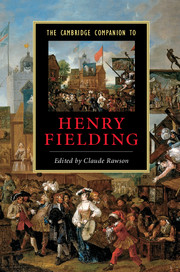Book contents
- Frontmatter
- Introduction
- 1 Henry Fielding’s life
- 2 Fielding’s theatrical career
- 3 Shamela
- 4 Joseph Andrews
- 5 Jonathan Wild
- 6 Tom Jones
- 7 Amelia
- 8 Fielding’s periodical journalism
- 9 Fielding and female authority
- 10 Fielding on society, crime, and the law
- 11 Fielding’s style
- 12 Fielding’s afterlife
- Guide to further reading
- Index
- Series List
1 - Henry Fielding’s life
Published online by Cambridge University Press: 28 July 2007
- Frontmatter
- Introduction
- 1 Henry Fielding’s life
- 2 Fielding’s theatrical career
- 3 Shamela
- 4 Joseph Andrews
- 5 Jonathan Wild
- 6 Tom Jones
- 7 Amelia
- 8 Fielding’s periodical journalism
- 9 Fielding and female authority
- 10 Fielding on society, crime, and the law
- 11 Fielding’s style
- 12 Fielding’s afterlife
- Guide to further reading
- Index
- Series List
Summary
Henry Fielding was born on 22 April 1707. His father, Edmund Fielding, was the son of a younger son of a seventeenth-century Earl of Desmond, whose family claimed kin (erroneously as it later turned out) with the imperial Habsburg dynasty. In 1707, at the age of twenty-seven, Edmund was a Lieutenant Colonel in Queen Anne’s army, and had served with distinction in the wars against France, including the Duke of Marlborough’s great victory at Blenheim (1704). Henry’s mother, Sarah, was daughter of Sir Henry Gould, who had succeeded in a more prosaic but no less powerful profession, rising to be one of the most distinguished lawyers of his time. It was at Sir Henry’s estate, Sharpham Park in Somerset, that Edmund and Sarah’s first child, named for his grandfather, was born. The match was a fruitful one, producing seven children in nine years: Henry was followed by Catherine, Ursula, Anne (who died in 1715 at the age of three), Sarah, Beatrice, and Edmund. Shortly before his death in 1710 Sir Henry Gould arranged the purchase of a substantial farm for them in the village of East Stour in Dorset. Here, in a rich rural setting later celebrated by the novelist Thomas Hardy, the Fielding children spent their early childhood, mostly in the care of their mother, since Edmund, who clearly found the idea of being a country squire unappealing, was often away on active service, or on pleasure trips in Ireland or London.
- Type
- Chapter
- Information
- The Cambridge Companion to Henry Fielding , pp. 3 - 16Publisher: Cambridge University PressPrint publication year: 2007
- 1
- Cited by



